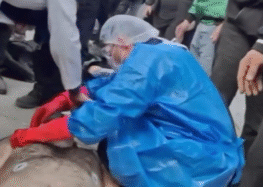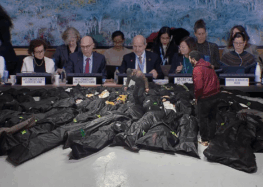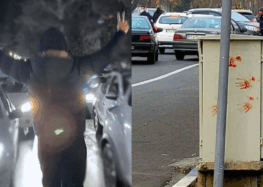Family of American Imprisoned in Iran Hopes for Pardon

“We hope he’ll be pardoned. We heard that some prisoners are usually released at the end of Ramadan, and we hope that Amir is among them. There are still a few more days before the end of the Ramadan and we hope he will be pardoned. Anyway, we can only be hopeful and the final decision lies with them,” Amir Hekmati’s sister told the International Campaign for Human Rights in Iran on August 7.
“We are in touch with his lawyer, but we don’t understand what’s going on. Not much can be said on the phone. His lawyer said that it’s a little hard to follow up on the case during the month of Ramadan, and we are waiting to find out more about the case after Ramadan,” Sara Hekmati, who lives in the US along with the rest of the Hekmati family, told the Campaign.
Amir Mirzaei Hekmati, a United States citizen whose family is from Iran, traveled to Iran for the first time on August 14, 2011, to visit family. He obtained an Iranian passport and permission to enter the country for three months from the Iranian Interests Section in Washington, DC. After two weeks in Iran, Hekmati was arrested and imprisoned in Evin Prison in Tehran, with no explanation to his family. In January 2012, Iran’s Revolutionary Court sentenced him to death on charges of “cooperating with an enemy state,” “membership in the CIA,” “moharebeh” (enmity with God), and “corruption on earth,” and aired a televised confession in which he claimed to be a CIA spy. His family has consistently held that he went to Iran to visit with his grandmother and that he was forced to make false confessions against himself. After international outcry, in March 2012 Iran’s Supreme Court overturned his death sentence and ordered a retrial. Amir Hekmati spent 16 months in solitary confinement and is now inside Evin Prison’s General Ward.
“From Amir’s letters, we have observed that he is in better shape psychologically. He writes that he has no problems, but even if he has problems, how would we know? They allowed him to have visits with his family members [in Iran] more than once a month. This is psychologically better for him, and it also gives us a chance to know more about his situation. We are very happy that at least he has been allowed to have more visits, because he was in solitary confinement for 16 months and he had no visits. He writes us letters which our family members scan and forward to us through email,” said Sara Hekmati.
“We hope he’ll be pardoned. We heard that some prisoners are usually released at the end of Ramadan, and we hope that Amir is among them. There are still a few more days before the end of the Ramadan and we hope he will be pardoned. Anyway, we can only be hopeful and the final decision lies with them,” she told the Campaign on August 7.
“We want Amir’s case to be decided sooner. My father has brain cancer and he is worried he won’t be able to see his son,” Sara Hekmati added.
After excerpts of Amir Hekmati’s confessions and court proceedings were shown on Iranian state television, the family issued a statement which they made available to the Campaign. In the statement, Amir Hekmati’s family expressed that they were “deeply concerned that Amir is not receiving a fair trial and has not been afforded due process,” adding: “It has been 126 days since Amir Hekmati was detained by the Iranian government after having been granted permission by Iranian authorities to enter to visit his beloved family. As stated before we believe the allegations made against Amir are false and believe that the purported confession was not voluntary and was made under severe duress.”






